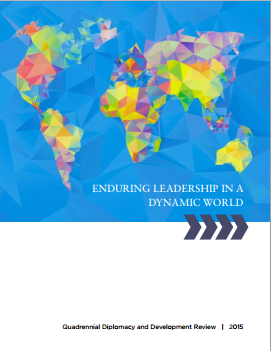The Quadrennial Diplomacy and Development Review (QDDR) [PDF] provides a blueprint for advancing America’s interests in global security, shared prosperity and universal values of human dignity and freedom. As a joint effort of the U.S Department of State and the U.S. Agency for International Development (USAID), the review identifies major global and operational trends that constitute threats or opportunities, delineates priorities and reforms, and informs budgets and management to ensure our civilian institutions are in the strongest position to shape and respond to a rapidly changing world.
The 2015 QDDR builds on the foundation established by the 2010 QDDR and its addendum to ensure that our civilian leadership reflects our commitment to review our work and profession, innovate constantly and adapt to new challenges and opportunities in a rapidly changing world. The 2015 QDDR promotes a shift from risk aversion to risk management, focusing not only on risk as physical security, but also programmatic, reputational and financial risk. By reinforcing USAID’s mission statement and our continued focus on partnership, local ownership, science and technology and results, it reaffirms USAID’s role as the U.S. Government’s lead development agency.
The 2015 QDDR spells out reforms that will strengthen the Department of State and USAID’s abilities to prevent and mitigate conflict and violent extremism, including establishing a strategic framework for engagement in fragile states and a new, prevention-focused civilian strategy for countering violent extremism. To better promote resilient, democratic societies, the 2015 QDDR strongly reinforces our commitment to democracy, human rights and accountable governance, and deepening partnerships with civil society to defend human rights of women, indigenous people, lesbian, gay, bisexual, transgender and intersex persons. It highlights how we continue to advance inclusive economic growth and help end extreme poverty by further elevating economic diplomacy and broadening our economic expertise.
The 2015 QDDR also calls for mainstreaming climate mitigation and resilience in all of USAID’s programs and names internal reforms to strengthen both the Department of State and USAID, including: leveraging data, technology and innovation, advancing strategic planning and investing in our ability to attract, retain, develop and deploy a premier workforce. All of these reforms will position the Department of State and USAID to more effectively respond to global trends and to achieve our objectives over the next four years and beyond.








Comment
Make a general inquiry or suggest an improvement.